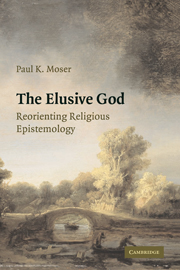Appendix: Skepticism Undone
Published online by Cambridge University Press: 29 July 2009
Summary
On the basis of widely neglected purposively available authoritative evidence, Chapter 1 challenged skeptics about divine reality. It argued that skeptics have no plausible way to recommend their own skeptical doubt about divine reality to people in general. This Appendix further challenges skeptics who invoke a difficult longstanding problem regarding epistemic circularity to support their skepticism. The motivation for this Appendix is straightforward: if skeptics are correct in their view of the pervasive undermining effects of epistemic circularity, the volitional theistic epistemology of this book is in big trouble. We shall see, however, that skeptics aren't correct after all.
Epistemologists have long given special attention, if properly unfriendly attention, to circularity in justification for beliefs. Such attention might stem just from a dislike of circularity, in the way that some people dislike fancy circular shapes in their evergreen bushes. Perhaps some epistemologists simply don't like the look of circles in justification. That's a real possibility, of course, but why would these epistemologists then bother to make a general case against circles in justification? If they are moved just by a personal dislike of circles, they might as well keep their dislike to themselves. In that case, their dislike wouldn't be relevantly different from my antipathy to eating coconut. It would be unconvincing for me to make a general case against eating coconut on the ground that I dislike its taste. You may very well like the taste of coconut, and that would settle that, my personal dislike notwithstanding.
- Type
- Chapter
- Information
- The Elusive GodReorienting Religious Epistemology, pp. 265 - 278Publisher: Cambridge University PressPrint publication year: 2008

